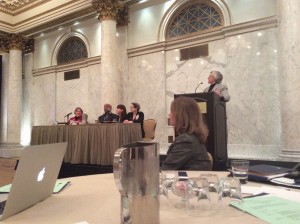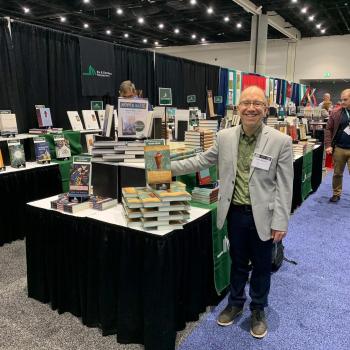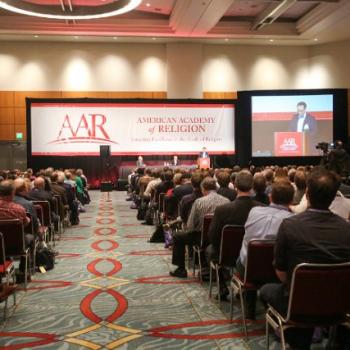I am currently in Baltimore with some colleagues, at a workshop focused on information fluency in the disciplines of religion, philosophy, and the history of ideas. It started yesterday, and has already offered a lot of fascinating perspectives from faculty and librarians, including practical examples and specific online tools that can be used for teaching and collaborative learning. The workshop is supported by the American Academy of Religion, the Society of Biblical Literature, and the American Philosophical Association.
If you are not familiar with the term, the aim of information fluency is to get beyond literacy to fluency in the domain of one’s ability to identify and utilize reliable sources of information. (See the recently-released ACRL framework for information literacy for more on this subject.)
One subject that has come up in conversation more than once is this: how do we get students to use the best, most detailed and deepest scholarly sources, when journalistic ones, blogs, and other such web pages are easier to read and understand
Julie Wroblewski of Benedictine University spoke about opportunities and challenges in integrating information fluency in teaching. What do the principles and the mapping of goals that we articulate in the abstract look like in practice in the classroom? Wroblewski talked about discovering that students were not using resources even when they were made available and emphasized. Often we have offered an information dump rather than something well-curated. Making LibGuides is not a solution to our problems if students are not using them. She discussed the need to also have librarians present in classes. What works well? Embedded librarians, working through the assignments and resources in class with the students. She also shared about having students work with library archive resources, leading to an online student-driven curation exhibit. Digital portfolios create opportunities to talk about information-related issues such as copyright. And getting students involved in scanning helps them understand why not everything is on the internet! Making students content-creators leads to them thinking about who produced other sources they encounter.
Benedictine University is a Catholic school with a large Muslim population, providing great opportunities for interfaith courses and projects. And so another topic that came up more than once is the need to find one’s niche (including the challenges of finding a niche in an online setting).
An analogy was made with kung fu and the turning of a weakness into a strength. Small programs face challenges, but the small are also often nimble compared to the large, and so applying the analogy to the university, small departments and programs can potentially change more easily than large ones.
Wroblewski also spoke about how gaming is somethng that is taken for granted. As a result they have learned a particular approach to challenges: they typically desire to experiment and to have freedom to fail and try again.
Kevin Miles from Earlham College talked about a collaborative project with Earlham, Antioch, and Wabash Colleges, the Ancient Greek Philosophy Initiative. It is like a small undergraduate conference – a day-long conversation about his students’ research in philosophy and that of others. Miles talked about information overload, even if you are working on ancient Greek literature. More has been written than even a scholar has time to read. There is an unmanageabl amount one could potentially read, not just considering what is being written now, but that which is dead and gone, written in the past. He encouraged us to avoid the dumptruck effect: If you have more on your mind than students can process and overwhelm them with it. Students have to embrace the fact that they will leave more food on the table than they are able to eat. Decisions must be made. One way to do that is to pursue a guiding question. This is educational in and of itself: students’ realization that the field is bigger than their ability to cover it.
The Earlham College mission statement talks about awakening the teacher within the student. Miles challenges students to teach him something as the professor. And he emphasized thay what is catching students’ attention in his approach is not just the content, but becoming part of a community of scholars. I found myself wondering what it would look like if all students in some classes were expected to submit a proposal to an undergraduate conference or journal.
Jane Pinzino talked about scholarship being a conversation, and conversation meaning collaboration. She mentioned Voyant tools, which will offer digital analysis of online texts that visual learners will find helpful, and which can provide macro-analysis that hopefully all students can benefit from. And so if one inserts the URL of an online text version of Plato’s Republic, and then eliminate stock words, one will get a world cloud that successfully highlights key ideas. Clicking on justice, for instance, will then provide a graph of how frequently the term appears, and where.
There were some very interesting discussion points in the Q&A time after that first panel. Someone mentioned that students experience frustration when their university work seems like it is merely a means to an end. Connection of the course to a greater purpose changes their outlook. Enthusiasm requires joy in relation to the process and not just the product.
Students need to become aware of how overwhelming the task of information acquisition is. Is the notion of mastery of a field no longer usable, even in relation to those who persue a PhD? On the more positive side, students can be encouraged to view themselves not as becoming “masters,” but adventurers, explorers in the world of possibilities. Pursue the conversation.
There was a lot of emphasis on Open Access. I especially appreciated this call: we need to take back control of our intellectual property!
Those are some particularly memorable points from the first day of the workshop. On the morning of the second day, we started with informal conversations over breakfast, seated grouped as faculty, librarians, and administrators. The first panel included Tom Wartenberg talking about teaching a course “Philosophy for Children” which gets college students teaching philosophy to second graders. It also included David Nienhuis, who talked about the challenges teaching the generation of students shaped by non-denominationalism, in which students adore the Bible but have not read it. He talked about trying to get students to think not primarily in terms of experts and non-experts, but participantes in a conversation that includes people now dead who dedicated their life to studying, and themselves still learning, and many others at a variety of stages. He also talked about trying to find ways of keeping atudents from just running in panic to commentaries looking for someone else to provide “the answer” for them.
In the question time afterwards, Nienhuis added that, when students ask about questions of historicity, he points out that you can ask the text such questions as much as one wants, but the text itself will never answer you.
These are some highlghts from the first day and a half of the workshop. I may share more later today or tomorrow, but much of the remainder of the workshop will focus on developing a plan for integrating information fluency in our disciplines at our various institutions.
Is the term “information fluency” meaningful to most blog readers? If not, how would you articulate the wise use of resources to gather, digest, and do things with sources of information? How do you seek to model good practices when it comes to informing yourself about anything?













